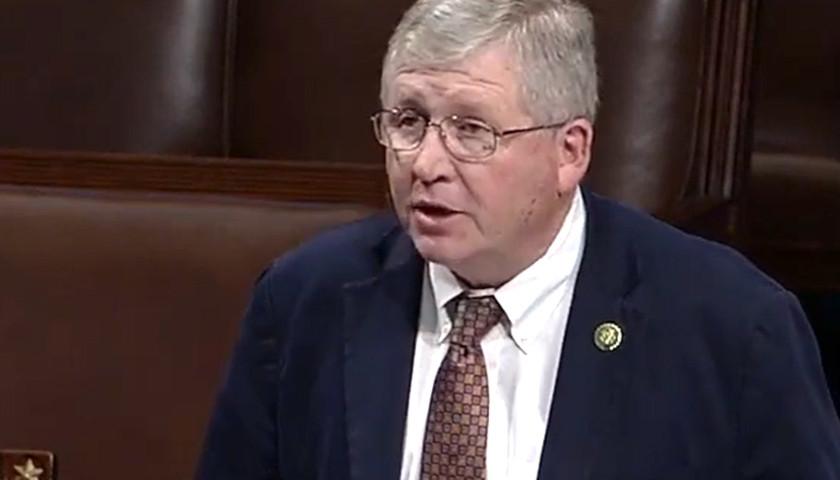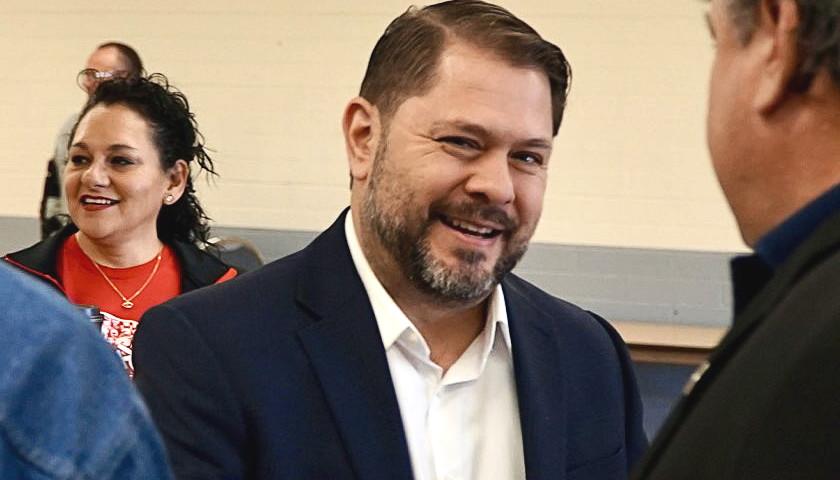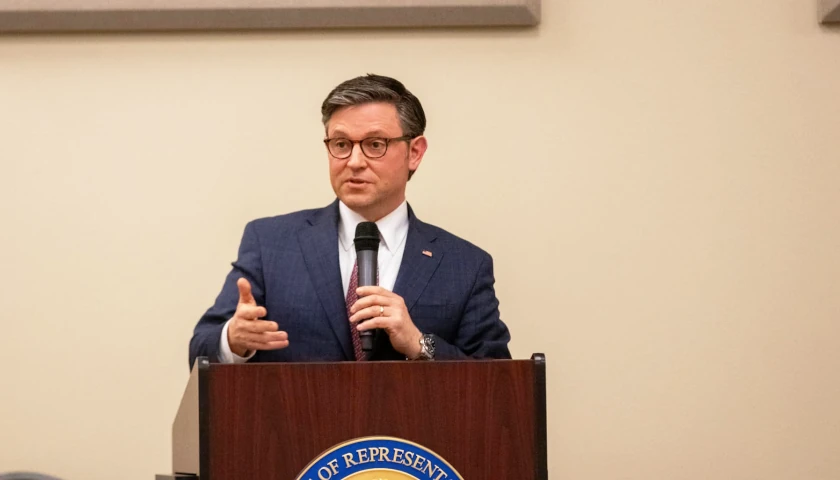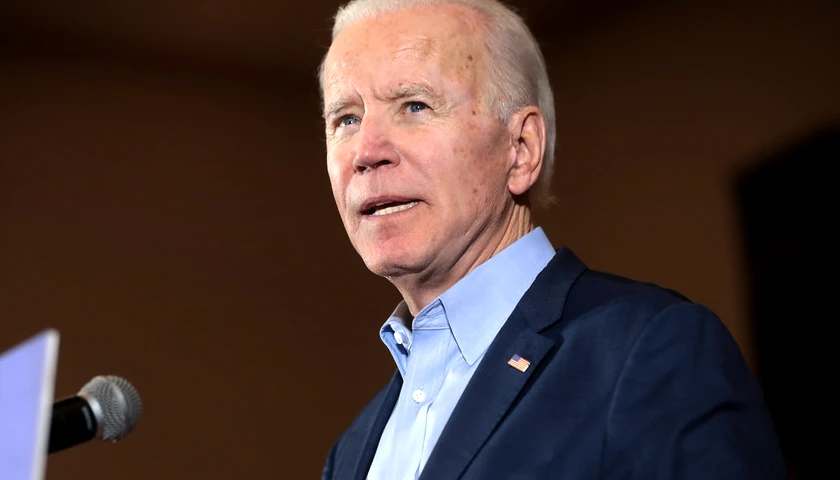by Steven Richards
A proposed rule from the Biden administration would require federal contractors to delegate “quasi-regulatory” authority to two environmental activist groups, the Carbon Disclosure Project (CDP) and Science Based Targets initiative (SBTi) collecting annual climate disclosures and target data for reduction in greenhouse gases from federal contractors. If the rule is implemented, federal contractors would be required to pay fees to these groups to comply with the regulation.
According to House Science, Space, and Technology Committee Chairman Frank Lucas (pictured above), “The rulemaking process was clearly subverted in order to favor certain environmentalist groups. And there were significant conflicts of interest where White House staff were advocating for regulations that would benefit their friends and former employers.”
The report, released this week by the House Science, Space, and Technology Committee, comes after an investigation into the proposed rule. The committee raised concerns about “the legality of the delegation of quasi-regulatory authorities to private entities” in its interim report and vowed to continue its investigation.
The committee held two hearings to probe why these specific entities were selected by the administration to provide climate related data from federal contractors.
The committee found that the White House Council of Environmental Quality (CEQ)—a division of the Executive Office of the President—may have exerted “inappropriate” influence on the committee responsible for writing the regulation to “unfairly” benefit these activist groups. The CDP and SBTi have ties to current CEQ staff and Democratic donor groups, respectively, which raises conflict of interest concerns.
The committee also warned the foreign ownership and activities of these groups, including operations in China, indicate that the White House may have overlooked significant national security considerations of delegating any of its authority to these groups.
“Our committee has already exposed many concerns that arise from making U.S. contractors disclose their emissions to a private foreign entity. The findings in this report make those concerns all the more urgent,” he said. “We will continue to investigate this matter and bring transparency to this process,” Lucas said.
In November of 2022, the Federal Acquisition Regulation (FAR) council proposed a rule to “implement a requirement to ensure certain Federal contractors disclose their greenhouse gas emissions and climate-related financial risk,” according to the Federal Register. FAR handles regulation for procurement and acquisition in the federal government and has representatives from the General Services Administration, the Defense Department, and NASA on its council.
The rule specifically names the Climate Disclosure Project (CDP) and the Science Based Tracking initiative (SBTi) as vendors that federal contractors would be required to use to report their emissions and “validate” science-based targets for reducing them.
Specifically, it would require federal contractors—which can vary from defense to construction companies—to use a CDP questionnaire and a SBTi evaluation to become certified as comply with the administration’s climate goals, and each of those groups charges fees for data collection and compliance review.
The inclusion of requirements to use CDP and SBTi did not emerge in a vacuum, but were spearheaded by a former employee of CDP that worked at the Council on Environmental Quality (CEQ) in the administration in what appears like a classic conflict of interest.
Betty Cremmins, the Director for Sustainable Supply Chains at the CEQ, “led efforts” to include requirements for federal contractors to use CDP and SBTi to disclose emissions and set targets, according to the report. Yet, Cremmins previously worked for CDP for 10 years, from 2010 to 2020, according to the report. Cremmins’ LinkedIn and X (formerly Twitter) profiles have been deleted.
Emails contained in the report show that Cremmins was in constant contact with her former colleagues at CDP while her council was advising FAR on drafting the proposed rule. This was contrary to what CEQ told the committee, the report said, providing evidence from CEQ testimony.
“Ms. Cremmins was in almost constant communication with CDP and SBTi for many months after the December 2021 memo, while simultaneously advising the FAR Council on the proposed rule,” the committee report reads. “In some cases, Ms. Cremmins went as far as coordinating with CDP to ensure their messages to the FAR Council aligned,” the report reads.
In one telling email, a former coworker at CDP emailed Cremmins to congratulate her on advancing green regulations from her office, specifically a federal “Buy Clean” initiative.
“When I first met you, you said your goal was to make CDP the law—and you did!” she said.
“[There’s] a whole lot more ahead to bring our massive $650B in spend [sic] to net zero emissions by 2050. It’s almost like we need some GHG disclosure and target-setting or something…” Cremmins said in her response. The greenhouse gas disclosures and target-setting are precisely what the proposed rule would mandate through CDP and SBTi.
Neither CDP nor SBTi responded to inquiries from Just the News about the potential conflicts of interest laid out by the committee. Neither the Council on Environmental Quality, nor Cremmins’ office could be reached for comment. The White House press team did not immediately respond to a request for comment on Friday.
In addition to the potential conflicts of interest, CDP and SBTi are not American climate groups but are both registered outside the country, raising national security concerns, the committee said in its report.
CDP Worldwide is the parent organization which has locations across the world. It is registered in England as a charity, according to the group’s website. One of its affiliated groups is CDP North America which is registered in New York, City as a 501(c)3.
CDP operates in Latin America, China, India, Hong Kong, Singapore, Japan, Indonesia and elsewhere through subsidiaries, local partners, and legally separate organizations—like the North American branch. Its operations in one of America’s key competitors, China, raises specific concerns.
CDP Worldwide has board members with a business or government history in China, specifically working with state-owned enterprises, which are under the control of the Chinese communist government, and the special government of Hong Kong—a legal autonomous province of China.
The Science Based Tracking initiative (SBTi) has close ties to CDP. The group describes itself as a collaboration between CDP, the United Nations Global Compact, World Resources Institute (WRI) and the World Wide Fund for Nature (WWF) and one of the We Mean Business Coalition commitments,” according to its website.
WRI, one of the groups behind SBTi, has its own Chinese connections. According to its 2022 annual report, its China operations are advised by Zhou Dadi, a former director of a research institute at a Chinese government body, He Jiankun, a former Vice President of Chinese state-backed university Tsinghua, and Qin Baoxing, a former Vice Minister and member of the Chinese State Council. One of the witnesses who testified before the committee raised specific concerns about the rule relating to national security, specifically highlighting the apparent Chinese connections.
“Delegating oversight functions to an entity supported by foreign governments, including China, raises serious concerns about the impact the Rule would have on procurement for national security,” Eric Fanning, President and CEO of the Aerospace Industries Association told the committee. Fanning also told the committee that a requirement for SBTi to “validate” emissions tracking plans would give that foreign entity power to shape which groups the government contracts with.
“It is unthinkable that this proposal would outsource governance to an international body, allowing foreign influence over who is qualified to build military equipment to protect our country,” he said.
Despite the presence of board member connections to Chinese state-owned companies and government bodies, the committee concluded that the FAR council did review these potential issues before moving forward with the rule.
“When asked if national security concerns were raised regarding government contractors disclosing potentially sensitive information to private third parties, including SBTi, which is a foreign based company, the FAR Council suggested that those issues had not been discussed,” the report reads.
The Department of Defense did not respond to a request for comment asking if these national security concerns were addressed during the drafting process.
In addition to foreign connections, SBTi also received support from a known Democratic dark money group, New Venture Fund, raising further conflict of interest questions.
One of SBTi’s backers, the We Mean Business Coalition, is backed by the New Venture Fund, as reported by the Washington Free Beacon. New Venture fund was described as a Democratic dark money group by the New York Times and according to Influence Watch, “is the largest 501(c)(3) nonprofit in the network of five nonprofits created and managed by Arabella Advisors, a Washington, D.C.-based philanthropy consulting company that caters to major foundations and organizations on the political Left.”
Ultimately, the committee vowed to move forward with its investigation and concluded “that the evidence shows that the decision to include CDP and SBTi in the proposed rule was based on a desire to steer power, influence, and regulatory authority to favored special interest environmental activist groups.”
– – –
Steven Richards is an investigative reporter at Just the News.
Image “Rep. Frank Lucas” by House Committee on Science, Space, and Technology.





